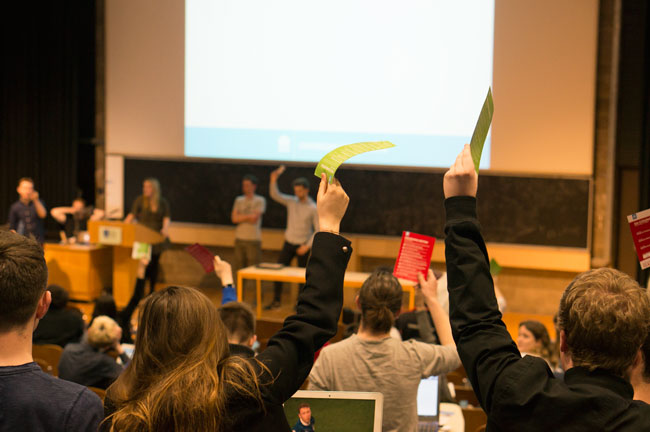Trinity College Dublin Students’ Union’s (TCDSU) council voted down a motion this evening calling for the union to support a campaign for an academic and economic boycott of Israel in Trinity.
The controversial motion drew numerous speakers, and while discussion was not heated, the division in the room was obvious. Many speakers on the pro-boycott side expressed personal experiences of living in Israel and the abuses they had faced. One Jewish student addressed council, calling on the union to oppose injustices in all its forms and support the motion.
Aoibhinn Loughlin, TCDSU Welfare Officer, spoke against the motion, warning that something this “divisive and drastic” must be voted on by every student – “we need to think about the impact of this”. Glen Byrne, TCDSU Communications Officer, warned that the union’s “negligible” impact on the Israeli-Palestine conflict, emphasising the damaging impact this would have on how students view the union and student politics.
Those in support called on the union to be “morally disciplined and noble”, with many speakers invoking Trinity’s support for Nelson Mandela, for whom House Six is named. Stacey Wrenn, who seconded the motion, told council of the considerable amount of student support for the Boycott, Divest and Sanctions (BDS) movement. The National Union of Students (NUS) in the UK, she said, supported the movement. One student told their story of being humiliated at checkpoints in Israel: “If this doesn’t show the apartheid, nothing will.”
Kevin Keane, TCDSU President-elect, told council that “the SU should exist to affect the community we have right here”. He was echoed in this by TCDSU President, Kieran McNulty, who told students “if you’re voting for this you’re taking away” from the union’s work on accommodation, student spaces and fees”. Conor Reddy, following Keane’s speech, said that Keane had signed a petition supporting the movement during the TCDSU elections campaign.
There were calls to move the motion to next council, as well as to end the discussion early. Both suggestions were voted down. During the debate, both sides referenced the recent preferendum on Irish unity, which saw 55 per cent of students vote in favour of neutrality on the issue. Daniel Crawford, third-year computer science class representative, argued that, if students had chosen to remain neutral on Northern Ireland’s constitutional status, they were not going to support campaigning for action on international affairs. However, a supporter of the pro-boycott side, argued that, considering the preferendum wouldn’t have mandated the union to hold a stance on Irish unity, this wasn’t a reason to vote down the motion on Israel. Other speakers, referencing similar votes in other universities, pointed to Trinity’s history of anti-apartheid activism. James McGovern, supporting the pro-boycott side, said the campaign was moderate, not radical.
The motion was proposed by science convenor, Reddy, and seconded by class representative for art history, Jewish and Islamic civilisation student Stacey Wrenn.
The motion would have mandated the union to perform a number of tasks in relation to the state of Israel. Council would have mandated the union to inform students on the background of “the situation in Israel/Palestine” and to set up a student-led Palestine solidarity campaign group via the union.
Furthermore, the union would have been mandated to support a “college-wide boycott of the state of Israel on anti-apartheid grounds” and to affiliate with the global BDS Movement. Finally, the union would have also been mandated to lobby for “the divestment of university funds from Israel and termination of any contracts with companies complicit in the occupation of Palestinian Territories and violation of Palestinian Human Rights more broadly”.
The failure of the motion follows the failure of a similar motion brought to the Graduate Students’ Union (GSU) in November 2016, which saw a tight vote following the abstention of many students ultimately fall against endorsing an academic boycott of Israel.
Speaking to The University Times in February, Ciarán O’Rourke, a PhD student who founded the independent group Students for Justice in Palestine, said that the BDS movement is “modelled on the global struggle against apartheid South Africa”.
The independent group recently protested at a planned visit to College by the Israeli Ambassador organised by the Society for Foreign and International Affairs (SOFIA), which led to the cancellation of the event.
O’Rourke recently attended a disciplinary hearing following the protest at which he was charged with a €150 fine for “conduct … that frustrates the holding of a previously authorised event, meeting or other function on campus”.
The group had planned to deliver a petition to “end research between Trinity College and Israel until Palestinian rights are respected” which had received over 2,000 signatures, to the Provost of the University, Prof Patrick Prendergast, and the Chancellor of the University, Mary Robinson, in February. However, this delivery was cancelled by the College.
Correction: 11.42pm, April 4th, 2017
An earlier version of this piece incorrectly stated Ciarán O’Rouke’s name. He is Ciarán O’Rourke, not Conor O’Rourke.







